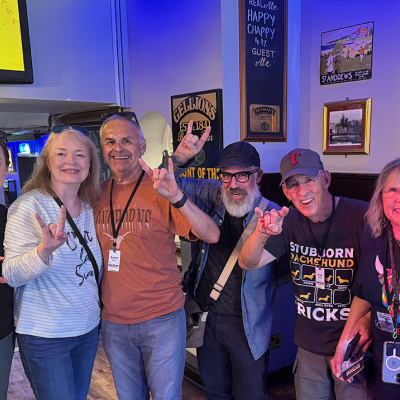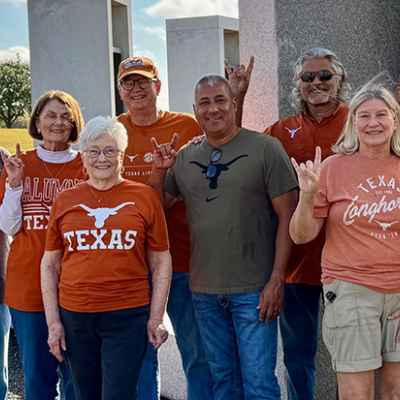Raising the Tail
Jim Allison’s pioneering spirit is pure Texan—and his cancer drug is a global breakthrough.

In 2004, two weeks before her wedding day, 22-year-old Sharon Belvin was diagnosed with advanced melanoma. The cancer had spread through her lungs, and after five months of chemotherapy, doctors found it had invaded her brain. Her odds weren’t good: at the time, 10-year survival rates for stage IV melanoma hovered around 10-15 percent.
But a cancer-free Belvin appeared on video at the Breakthrough Prize ceremony in Mountain View, Calif., last December, and she credits Jim Allison, BA ’69, PhD ’73, with saving her life. Belvin’s tumors vanished after she received anti-CTLA-4, a then-experimental drug now known as ipilimumab.
The drug and its promising new cancer strategy, called immune checkpoint therapy, were pioneered by Allison, an MD Anderson Cancer Center immunology professor. After years of basic-science research into the immune T-cell, Allison suspected that what he’d discovered might lead to a new approach to fighting cancer—one that treats the immune system rather than the cancer. He was right. Ipilimumab has put many patients like Belvin into a lasting remission. It was for that achievement that Allison received the $3 million Breakthrough Prize, an elite honor for researchers whose work extends human life.
Also appearing in the Breakthrough Prize ceremony video was Allison himself, singing and playing harmonica. The camera crew had requested it, because Allison is a veteran blues player. His band, the Checkpoints, had its origins six years ago in a jam session with fellow researchers. Members of the band live all over the country, but they do a few gigs a year at conferences, playing to cancer researchers, physicians, and grad students.
“His style, musically?” muses the guitar player, a University of Chicago oncologist named Tom Gajewski. “Gritty blues music, and he sings a few of those songs, too.” These include “Big Boss Man” and “Cigarettes, Whiskey, and Wild Women.”
“Some of them have—you know—some innuendo,” Gajewski adds.
Growing up in Alice, Texas, Allison dissected frogs in his free time. There, math teacher Ernestine Glossbrenner and counselor Stan Brooks spotted his promise and steered the eighth-grader toward UT’s summer classes, which he attended through high school. He got hooked on biology after a summer class with the late UT professor Irwin Spear, and entered the university at just age 16. His first science job was washing glassware in the lab of G. Barrie Kitto, who now directs the Center for Biotechnology.
“Austin was a great place then,” Allison recalls, remembering the performances he saw: Stevie Ray Vaughn, Jerry Jeff Walker, Waylon Jennings, Kris Kristofferson. And, of course, the Red-Headed Stranger: “I don’t know how many times I saw Willie [Nelson] and his band,” he adds.
It was in grad school that he tried harmonica and knew he was on to something good. “I just messed around for a while and I realized, I know how to play this thing,” Allison says. “It was just sort of visceral.”
That same willingness to go with his gut has served Allison well in the lab. “He won’t focus a lot on memorizing anything, but just feels the music,” Gajewski says. “As a scientist, too, he has great instincts. He has intuition about where to go next.”
After a postdoctoral fellowship at Scripps Clinic, Allison took a job at MD Anderson’s Smithville research center, a stone’s throw from Austin. There he grew fascinated by immune T-cells, which defend the body from foreign invaders. As he tried to figure out their complex workings, Allison discovered the cells’ “ignition switch.” Crucially, he also figured out that they have an off switch, or checkpoint. That checkpoint prevents them from attacking the body’s own cells, and it had stymied previous efforts to get the immune system to fight off cancer. It was then that Allison asked the key question that would bridge him from pure scientific curiosity to a major advance in cancer care: What if that checkpoint could be blocked?
For over a decade, in a career that took him from the University of California, Berkeley to Memorial Sloan Kettering Cancer Center in New York City, Allison built upon that basic-science groundwork to develop the first checkpoint-blocking drug. When ipilimumab was tested on advanced melanoma patients like Belvin, it halted tumor growth cold for one in four patients. It has shown promise in other cancers, too.
Immune checkpoint blockade actually ignores the cancer itself. Instead, it works by releasing the brakes on immune T cells. That allows them to recognize and destroy tumors.
For many cancer patients, immune checkpoint blockade has altered the “tail” of the survival curve, a reference to a graph that plots survival over time in cancer populations. Previously this line would quickly slant toward zero, meaning that nearly zero people with these cancers survive for long. But with drugs like ipilimumab, the line levels off into a “tail” that can trail along for years, denoting better survival.
That innocent scrap of terminology became immortal after Allison got hold of it. He once quipped about the survival curve, “‘So what we gotta do is try to raise ’er tail!’” The phrase “raising the tail” subsequently caught on in the immunotherapy community..
“When you say it with a straight voice and you’re talking about survival curves, nobody’s chuckling,” Gajewski says. “But when Jim says it with his gruff sort of return-to-rural-Texas voice, it sounds like he’s in a roadside bar somewhere.” Maybe that’s why an employee at Jounce, the biotech company Allison and Gajewski co-founded, has brewed a beer called Raise the Tail Ale.
Last December, Allison learned he’d won one of six Breakthrough Prizes in Life Sciences, which are bankrolled by Facebook founder Mark Zuckerberg and Russian entrepreneur Yuri Milner. At the ceremony, his growly, soulfulrendition of the Muddy Waters classic “I’m A King Bee” preceded Belvin’s poignant testimony.
“It was a really moving moment,” Allison says. “I didn’t wake up every day trying to think of what I could do about cancer. I [thought, I just want to] understand how T-cells work as best as I can, and maybe once I do that then I’ll know enough to do something intelligent about cancer …. I’m really lucky and very privileged to be able to do this.”
If you want to see the Checkpoints, head for Chicago on June 3rd. They’ll play the House of Blues that night for the American Society for Clinical Oncology crowd—mostly covers, with at least one song from every decade from the 1940s onward.
“We try to play music that makes people happy and gets ’em dancing,” Allison says. If his amazing cancer drug doesn’t do it, his blues harp just might.
Photo courtesy Michael Stravato.





